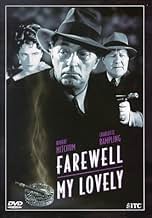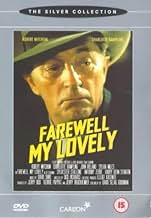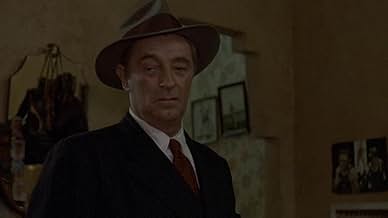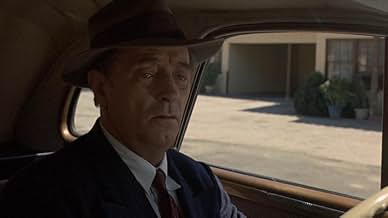VALUTAZIONE IMDb
7,0/10
10.423
LA TUA VALUTAZIONE
L'investigatore privato di Los Angeles Philip Marlowe viene assunto dal detenuto in libertà vigilata Moose Malloy per trovare la sua ragazza Velma, ex ballerina di uno squallido locale nottu... Leggi tuttoL'investigatore privato di Los Angeles Philip Marlowe viene assunto dal detenuto in libertà vigilata Moose Malloy per trovare la sua ragazza Velma, ex ballerina di uno squallido locale notturno.L'investigatore privato di Los Angeles Philip Marlowe viene assunto dal detenuto in libertà vigilata Moose Malloy per trovare la sua ragazza Velma, ex ballerina di uno squallido locale notturno.
- Regia
- Sceneggiatura
- Star
- Candidato a 1 Oscar
- 1 vittoria e 3 candidature totali
Jimmy Archer
- Georgie
- (as Jimmie Archer)
Recensioni in evidenza
The work of Raymond Chandler experienced a resurgence in the 1970s, thanks to Robert Altman's 'The Long Goodbye (1973)' and Roman Polanski's very Chandler-ish 'Chinatown (1974).' The waning career of Robert Mitchum was also revived by two Chandler adaptations, 'Farewell, My Lovely (1975)' {previously filmed by Edward Dmytryk as 'Murder, My Sweet (1944)'} and 'The Big Sleep (1978) {previously filmed by Howard Hawks}. Though outside the traditionally-accepted film noir period (approx. 1940-1958), the 1970s provided an ideal climate for a resurgence of the style. The demise of the Production Code in the 1960s had allowed filmmakers the freedom to explore more explicit themes, usually implying an increase in language, violence and nudity. Chandler's novels – which typically dabbled in themes of prostitution, homosexuality and pornography – could now be adapted faithfully without the threat of censorship, though fortunately, in the case of this particular film, director Dick Richards doesn't overdo the sleaze. The source material is one of the few Marlowe novels I haven't read, but 'Farewell, My Lovely' nevertheless seems a loyal interpretation of the author's style.
Philip Marlowe is the sort of role that Robert Mitchum would have nailed in the 1950s, when he always seemed to feel old and weary without actually looking it. Nevertheless – though he lacks the cocky vigour of Dick Powell, or the invincibility of Humphrey Bogart – the aging Mitchum does communicate what is perhaps Marlowe's most defining characteristic: that of a disillusioned, world-weary private dick looking for something in this world, anything, worth fighting for. In his latest case, Marlowe is hired by fearless lug Moose Malloy (Jack O'Halloran) to find his girlfriend Velma, who vanished while Malloy was serving a prison sentence. As always, what had initially seemed a straightforward assignment soon gets Marlowe embroiled in a complex patchwork of deceits, murders and double-crossings. Crucial to the mystery is Charlotte Rampling (emulating Lauren Bacall) as the adulterous wife of an old millionaire, and Oscar-nominated Sylvia Myles as an alcoholic performance artist. Also look out for small roles from Harry Dean Stanton as Det. Rolfe, and Sylvester Stallone as a lustful thug.
'Farewell, My Lovely' does a fine job of translating Chandler's pessimistic vision of urban decay and human depravity. The 1940s adaptations are, of course, superbly entertaining, but most of them – particularly 'The Big Sleep (1946)' and 'Lady in the Lake (1947)' – are clearly filmed on a pristine studio set, somewhat offsetting the grittiness of Chandler's characters and plot. Richards' film, to his credit, is incredibly ugly. Aside from Helen Grayle, whose sprawling mansion suffers next to Buckingham Palace, most of Marlowe's witnesses live in appalling squalor; even his own office is drab and bathed in shadow. Yet, despite the unpolished milieu, 'Farewell, My Lovely' most assuredly has a heart. Marlowe's wordless interactions with the son of a penniless musician help us see beneath the detective's front of indifference, hinting at his admiration for the honest working-class, and his fervent distaste towards the decadence of the wealthy. When offered his own wealth, Marlowe unthinkingly surrenders it to someone he deems more worthy, a touching but cheerless ending to a film steeped in the unpleasantness of human existence.
Philip Marlowe is the sort of role that Robert Mitchum would have nailed in the 1950s, when he always seemed to feel old and weary without actually looking it. Nevertheless – though he lacks the cocky vigour of Dick Powell, or the invincibility of Humphrey Bogart – the aging Mitchum does communicate what is perhaps Marlowe's most defining characteristic: that of a disillusioned, world-weary private dick looking for something in this world, anything, worth fighting for. In his latest case, Marlowe is hired by fearless lug Moose Malloy (Jack O'Halloran) to find his girlfriend Velma, who vanished while Malloy was serving a prison sentence. As always, what had initially seemed a straightforward assignment soon gets Marlowe embroiled in a complex patchwork of deceits, murders and double-crossings. Crucial to the mystery is Charlotte Rampling (emulating Lauren Bacall) as the adulterous wife of an old millionaire, and Oscar-nominated Sylvia Myles as an alcoholic performance artist. Also look out for small roles from Harry Dean Stanton as Det. Rolfe, and Sylvester Stallone as a lustful thug.
'Farewell, My Lovely' does a fine job of translating Chandler's pessimistic vision of urban decay and human depravity. The 1940s adaptations are, of course, superbly entertaining, but most of them – particularly 'The Big Sleep (1946)' and 'Lady in the Lake (1947)' – are clearly filmed on a pristine studio set, somewhat offsetting the grittiness of Chandler's characters and plot. Richards' film, to his credit, is incredibly ugly. Aside from Helen Grayle, whose sprawling mansion suffers next to Buckingham Palace, most of Marlowe's witnesses live in appalling squalor; even his own office is drab and bathed in shadow. Yet, despite the unpolished milieu, 'Farewell, My Lovely' most assuredly has a heart. Marlowe's wordless interactions with the son of a penniless musician help us see beneath the detective's front of indifference, hinting at his admiration for the honest working-class, and his fervent distaste towards the decadence of the wealthy. When offered his own wealth, Marlowe unthinkingly surrenders it to someone he deems more worthy, a touching but cheerless ending to a film steeped in the unpleasantness of human existence.
Farwell My Lovely is much closer to the novel than the other previous adaptation Murder My Sweet from the 40's. This film is also a better film, but it has some flaws and seems like it was just made a decade too late. For starters let's talk Phillip Marlowe, Raymond Chandler's anti-hero. I liked Bogart's Marlowe a whole lot and find his portrayal my favorite, yet Mitchum does a very credible even superior job as the private eye working within his own code of ethics. He says the narration lines wonderfully and he looks 1940's. He, if the lighting is really good which fortunately for him isn't too terribly often, looks a little worse for wear at times, but I believe he carries the role off both in spirit and physicality. The rest of the cast is equally good with some spot-on character acting from the likes of John Ireland, Anthony Zerbe, and Sylvia Miles giving a really good performance as a lush and one time lounge singer. The story, like much of Chandler's work,is surprisingly complex as Marlowe is brought into the case of a missing girlfriend of an ex-con and another case of abducted jade jewelry - both cases melding together and bringing about a rather astounding conclusion. Director Dick Richards conveys the atmosphere of the time period impeccably. Farewell My Lovely is a solid mystery with a chance to see some first-rate acting by an American screen legend Robert Mitchum.
L.A. of June 1941 as it was depicted in the Raymond Chandler's novel of the same title is filled with the dark secrets of the past that better stay uncovered. Philip Marlow, PE (Robert Mitcum) takes a job to find a vanished girlfriend of the felon Moose Malloy, and he has no idea what will follow. As Marlow searches for Velma Galento, he has to deal with a beautiful but cold and calculating seductress (Charlotte Rampling - young, sensual and dangerous), a jealous corrupt detective (Stanton), an old alcoholic girlfriend (Sylvia Miles in one of her two Oscar nominated performances, second - the shortest in the history of Oscars, for "Midnight Cowboy"), and a buffed thug (Sylvester Stallone -- it was fun to see him before he became a star of Rocky and Rambo).
This adaptation of Raymond Chandler novel features action, suspense, humor, mystery and Robert Mitchum in one of his best performances as a man struggling with cynicism, hatred, and betrayal.
This adaptation of Raymond Chandler novel features action, suspense, humor, mystery and Robert Mitchum in one of his best performances as a man struggling with cynicism, hatred, and betrayal.
The choice of Mitchum for the lead role really did work. The novel suggest a tired Marlowe, who has had enough of being "detective to the stars". He wants to get out of his seedy little life, and change things, but instead, he gets wrapped up in another case. Mitchum's hang dog expression and tired wise guy act sums up the depression of the fallen hero. This is not the smooth talking Bogart, not the finely clipped and smooth Powell, but a harder, more experienced Marlowe, a man more aware of his own downfall. As he says to knulty, what he need is a nights sleep, what he needs is another drink. After watching this truly excellent recreation of late forties LA, I'm not sure that I couldn't agree with him.
Ah yes, and Charlotte Rampling and the sometime Thelma really was "cuter than lace pants"
Ah yes, and Charlotte Rampling and the sometime Thelma really was "cuter than lace pants"
Farewell, My Lovely (1975)
A Truly Gorgeous, Vivid, Stylish Color Noir...Don't Prejudge it on 1940s Noir Terms!
This is a gorgeous surprise, a retreat forward, a 1940s drama not done in painful nostalgic pastel hues and soft edges, but in bold bright 1975 color and pitch dark shadow. You have to say the obvious and get it over with: yes, this is a modern "film noir." But it isn't a mere homage, nor a remake, nor a cheap imitation. Director Dick Richards, who has no other well known film to his credit, pulls a gem out of nowhere on this one. Just be sure to watch it for what it is, a dramatic period crime film, not for what you think it ought to be, a slavish remake of a classic noir. And he has the help of the perfect cinematographer for the subject, John A. Alonzo, who did both Chinatown (the year before) and eight years later, Scarface, both post-noir landmark crime films.
Of course, this version of Farewell, My Lovely is, strictly speaking, a remake, which is to say, it's the third movie based on Raymond Chandler's 1940 novel of the same name. And inevitably we are going to compare to the other great version, Dmytryk's 1944 true, early film noir (called Murder, My Sweet). I say other great version, because both are really fine films, and different enough to avoid copycatting. Farewell, My Lovely is actually the more original of the two, an irony after 31 years of influences. And in some ways it's better, mainly because it has Robert Mitchum very much in top form. He makes those beautifully concise and witty one liners seem real and fitting, as if people really did once talk like that. I wish they still did.
There are countless bit parts that pump up the stylishness of the movie, most memorably Sylvia Miles playing a hard-drinking has-been. And she and Mitchum have great chemistry, not as lovers, but as people from opposite sides of life who have a similar perspective on things, and they chat and resonate like old friends. (Compare this to the rougher, less involving scene in Murder, My Sweet.) Velma herself is none other than Charlotte Rampling, probably a hair miscast because Rampling has some kind of severity that the noirish femme fatales don't, as a stereotype, share. And this movie deals with stereotypes.
Mitchum above all. It's fascinating to see a movie that is meant to be fitting into a form well known enough to be able to both refer to (in style and plot) and to deviate from (so we can feel it's original intent). And to have Mitchum, with his decades of great, strong, roles, anchor it all makes for a sweet, almost poignant experience. A similar feeling might be had in the remake of Cape Fear, but for my money, this is the more interesting movie, whatever the limitations of the plot, and the big thug. Go ahead, compare the Dmytryk version to this Richards one. If you haven't seen either one, watch the more recent one first to give it a full chance. You might go away surprised.
A Truly Gorgeous, Vivid, Stylish Color Noir...Don't Prejudge it on 1940s Noir Terms!
This is a gorgeous surprise, a retreat forward, a 1940s drama not done in painful nostalgic pastel hues and soft edges, but in bold bright 1975 color and pitch dark shadow. You have to say the obvious and get it over with: yes, this is a modern "film noir." But it isn't a mere homage, nor a remake, nor a cheap imitation. Director Dick Richards, who has no other well known film to his credit, pulls a gem out of nowhere on this one. Just be sure to watch it for what it is, a dramatic period crime film, not for what you think it ought to be, a slavish remake of a classic noir. And he has the help of the perfect cinematographer for the subject, John A. Alonzo, who did both Chinatown (the year before) and eight years later, Scarface, both post-noir landmark crime films.
Of course, this version of Farewell, My Lovely is, strictly speaking, a remake, which is to say, it's the third movie based on Raymond Chandler's 1940 novel of the same name. And inevitably we are going to compare to the other great version, Dmytryk's 1944 true, early film noir (called Murder, My Sweet). I say other great version, because both are really fine films, and different enough to avoid copycatting. Farewell, My Lovely is actually the more original of the two, an irony after 31 years of influences. And in some ways it's better, mainly because it has Robert Mitchum very much in top form. He makes those beautifully concise and witty one liners seem real and fitting, as if people really did once talk like that. I wish they still did.
There are countless bit parts that pump up the stylishness of the movie, most memorably Sylvia Miles playing a hard-drinking has-been. And she and Mitchum have great chemistry, not as lovers, but as people from opposite sides of life who have a similar perspective on things, and they chat and resonate like old friends. (Compare this to the rougher, less involving scene in Murder, My Sweet.) Velma herself is none other than Charlotte Rampling, probably a hair miscast because Rampling has some kind of severity that the noirish femme fatales don't, as a stereotype, share. And this movie deals with stereotypes.
Mitchum above all. It's fascinating to see a movie that is meant to be fitting into a form well known enough to be able to both refer to (in style and plot) and to deviate from (so we can feel it's original intent). And to have Mitchum, with his decades of great, strong, roles, anchor it all makes for a sweet, almost poignant experience. A similar feeling might be had in the remake of Cape Fear, but for my money, this is the more interesting movie, whatever the limitations of the plot, and the big thug. Go ahead, compare the Dmytryk version to this Richards one. If you haven't seen either one, watch the more recent one first to give it a full chance. You might go away surprised.
Lo sapevi?
- QuizIn the novel, Philip Marlowe was in his 30s. Robert Mitchum, who plays him in this film, was 57.
- BlooperWhen Marlowe (Robert Mitchum) drives up to Mrs. Grayle's home (Charlotte Rampling), the front entrance is obviously double doors but when the butler is shown opening it from the inside, it is clearly a single door.
- Citazioni
Philip Marlowe: [voiceover] The house itself wasn't much. It was smaller than Buckingham Palace and probably had fewer windows than the Chrysler building.
- ConnessioniFeatured in Proini peripolos (1987)
- Colonne sonoreI've Heard That Song Before
Words and Music by Jule Styne and Sammy Cahn
Sung in the dance hall at the opening.
I più visti
Accedi per valutare e creare un elenco di titoli salvati per ottenere consigli personalizzati
- How long is Farewell, My Lovely?Powered by Alexa
Dettagli
Botteghino
- Budget
- 2.500.000 USD (previsto)
Contribuisci a questa pagina
Suggerisci una modifica o aggiungi i contenuti mancanti


































